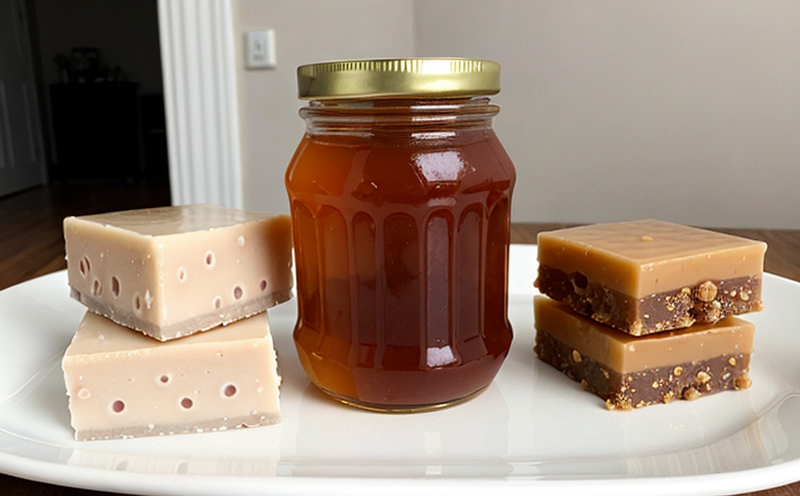EN 17425 Polycyclic Aromatic Hydrocarbons Testing in Honey
EN 17425, published by CEN (European Committee for Standardization), provides a harmonized method for the determination of polycyclic aromatic hydrocarbons (PAHs) in honey. This standard is crucial for ensuring food safety and quality, especially concerning the presence of PAHs which can result from environmental contamination or processing conditions.
The testing procedure involves several steps to ensure accurate results. The sample preparation includes homogenization followed by filtration to remove particulates. Afterward, the extract is analyzed using high-performance liquid chromatography (HPLC) coupled with fluorescence detection. This combination allows for precise quantification of PAHs based on their characteristic emission spectra.
The standard specifies lower limits of detection and quantitation that are critical for food safety compliance. The method's sensitivity ensures that even trace amounts of PAHs can be detected, which is essential given the potential health risks associated with high levels of these compounds. Compliance with this standard demonstrates a commitment to maintaining product integrity and protecting consumer health.
In practical application, laboratories must adhere strictly to the procedural guidelines outlined in EN 17425 to ensure reliable data. This includes using certified reference materials (CRMs) for calibration purposes, performing quality control checks regularly, and adhering to good laboratory practices throughout each step of the analysis process.
- Sample preparation: Homogenization and filtration
- Analytical technique: HPLC with fluorescence detection
- Lower limits of detection: As per EN 17425 specifications
- Calibration standards: Use of certified reference materials (CRMs)
The importance of this testing cannot be overstated, particularly in the context of international trade and consumer safety. By ensuring that honey products meet stringent PAH content requirements, manufacturers can protect their reputation while also complying with regulatory mandates.
For quality managers and compliance officers working within the food sector, understanding the implications of EN 17425 is paramount. It serves as a benchmark for establishing robust quality assurance protocols aimed at minimizing risks associated with PAH contamination. Compliance with this standard not only enhances product safety but also supports broader sustainability goals by reducing environmental impacts.
Additionally, R&D engineers involved in developing new formulations or optimizing existing processes benefit greatly from comprehensive PAH testing according to EN 17425. This ensures that innovations do not inadvertently introduce harmful substances into the final product, thereby safeguarding both human health and regulatory compliance.
Procurement teams also stand to gain significantly by leveraging EN 17425-compliant testing services when sourcing raw materials or ingredients from suppliers abroad. This helps maintain consistent quality standards across supply chains, fostering trust among stakeholders and contributing positively towards achieving global certification objectives.
Eurolab Advantages
Eurolab offers unparalleled expertise in implementing EN 17425 compliant polycyclic aromatic hydrocarbon (PAH) testing for honey products. Our state-of-the-art facilities equipped with advanced analytical instrumentation provide precise and accurate results every time.
- ISO/IEC 17025 accredited laboratory
- Comprehensive quality control measures
- Trained and certified analysts
- Use of cutting-edge technology including HPLC systems with fluorescence detection
We pride ourselves on delivering reliable data that meets or exceeds regulatory requirements. Our team works closely with clients to understand their specific needs, whether it's routine testing for quality assurance purposes or one-off assessments required by government authorities.
Our commitment extends beyond just providing laboratory services; we offer expert advice and guidance throughout the entire process from sample receipt through final report issuance. This ensures that our customers receive not only accurate test results but also actionable insights into how they can improve their operations to further enhance food safety standards.
Quality and Reliability Assurance
At Eurolab, we take pride in maintaining the highest levels of quality assurance. Our commitment to reliability is reflected in our ISO/IEC 17025 accreditation, which ensures that all laboratory procedures meet internationally recognized standards.
- Regular calibration and validation of equipment
- Participation in proficiency testing programs
- Continuous training for staff members
- Implementation of robust quality management systems
We understand the importance of accuracy in PAH testing, which is why we employ highly skilled professionals who are dedicated to providing precise and reliable results. By adhering strictly to EN 17425 guidelines, our analysts ensure that every test conducted meets the stringent requirements set forth by this European standard.
Our participation in proficiency testing programs allows us to continuously monitor performance against established benchmarks. This helps identify any areas for improvement while reinforcing our reputation as a trusted provider of high-quality analytical services.
Customer Impact and Satisfaction
The impact of reliable polycyclic aromatic hydrocarbon (PAH) testing cannot be overstated, particularly within the honey industry. By ensuring compliance with EN 17425 standards, manufacturers can safeguard their reputations while also demonstrating a commitment to consumer safety.
For quality managers and compliance officers, this means peace of mind knowing that they are meeting regulatory requirements without compromising on product quality. R&D engineers benefit from having access to accurate data which enables them to make informed decisions regarding formulation changes or process improvements.
Procurement teams gain added value by partnering with Eurolab for their PAH testing needs. Our expertise ensures that only the highest quality raw materials are sourced, thereby enhancing overall product integrity and consistency across supply chains.
Moreover, our customer-centric approach guarantees swift turnaround times coupled with clear communication throughout each stage of the project. This fosters stronger relationships built on mutual trust and respect between us and our clients.





